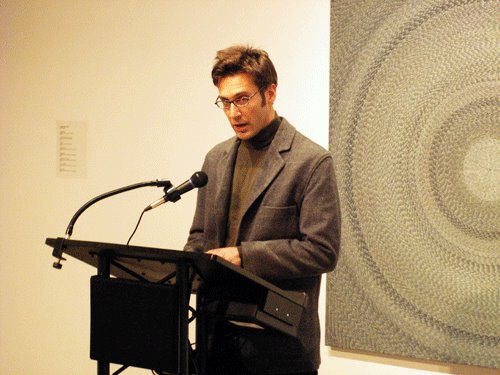
Gabriel Gudding is the author of two books,
A Defense of Poetry (Pitt Poetry Series,2002) and
rhode island notebook (Dalkey Archive Press, 2008), the latter being a book he wrote entirely in his car during 25 roundtrips on the highways between Providence, RI and Normal, IL. The book is a mixed-genre work chronicling the play of sorrow in the driver’s life and a nation’s march to war. A resident of Normal, Illinois since 2002, he teaches Literature and Creative Writing at Illinois State University. He is a trained mediator for the university and practices Vipassana meditation in the tradition of Sayagyi U Ba Khin. His work appears in such venues as
New American Writing,
LIT,
Fence,
American Poetry Review,
Sentence,
Jacket, and in such anthologies as
Great American Prose Poems: From Poe to the Present (Scribner, 2003). He serves on the Board of Directors for the internationalist magazine
_Mandorla: New Writing from the Americans/ Nueva Escritura de las Américas_. He has begun two creative writing programs in prisons and maintains a blog,
Conchology. And oh yeah: "Gudding" rhymes with pudding.
MINNESOTA [first appeared in
NEW AMERICAN WRITING]
And without your brief umbrella
when I was wild
I was young, and the lakes I had been to
and the lake I had been in
were petrol blue in the evening
and stray smells of straw were on them
and nearby the maple docks
the attention of the carnivores
was bound in the gooses
all these living things
on the lake home
when I was a child, I was
wild upon it, the tennis court by the lake
strange how the animals
enjoyed their wings
some of the small live things were swollen
others tiny, some were windy
there was a squirrel who was windy
none had umbrellas
and for a while when I was 12
my parents did love the lakes, and all of us
and themselves
NO, POPSICKLE [first appeared in
Court Green]
for Kerry Mahan Griner
No, popsickle: stay.
Don’t be eaten. Remain in the freezer, the
super market, lodge in the long
far-traveling fridge truck—Be convoyed: indeed
be conveyed for a Dakota
a Missouri—but when the truck arrive
at its depository
—or store—at the end of what hot bridge in the dim forenoon,
stay, little bulb of colored cold,
far in your cozy no-no.
I say chill, be a child, popsickle, refuse.
AN DITCH [first appeared in
LIT]
They have leftht uth a lone at latht
There are logth and thtarth to thtub our toeth and catch too at our eyeth:
Thith ditch ith gloriouth.
Look at them! The night’s jars, the thtrange daubing wellth of light:
You over me then like a thtar!, our legth twining
below our grointh.
Your deep fish. My hand-ache. My handth walk
into the China of your boobieth.
Making love in thith ditch
ith gloriouth!
BILLY COLLINS
The small beads of grease
riding the soup-sheen
are all I have.
I would suck them up
and forget the soup.
They are orange as kerosene
as if they spilled from a farm house
deep in the soup.
Maybe I will put my eye down
close to the grease waves
and try to see the fields
and the distant churchyard
in the chicken noodle.
I will wave to the farm girl
waiting for her mama, and think
what a lank silo of seed
will meet her
in those fields.
DEAR EAGLES [first appeared in
The Canary]
I am bored by beagles those happy dogs
so indelibly at gates. They’re unlike
the nation’s eagles who bang on gelid gusts
above our fields and shining logs. I am
not, thus, bored by yóu—all
your pleasures gentried, such epaulets
and fuss—and never over are the clawed towings
of fish with your angled feathers, no: Dó call me
an eagle lover, then. You are possibles.
Yet too you that once that were some symbols
of this nation that dealt some blows: you are not now
—nor are you ever always will be again—
ethicals,
your country’s over. And though you’re here still,
you will surely go.
For I have seen few snowmen outlast the snows.
Sincerely,
Gabriel Gudding
LITERARY NARCISSISM AND THE MANUFACTURE OF SCANDAL
1. A Literary Narcissist’s behavior will not only tolerate but encourage attacks on himself so long as it can translate his own self-fascination into more news of himself.
2. Just as the Narcissist will use argument, catastrophe, disputation to attract attention, certain people will be willing to dispute the Narcissist in order to participate in the economy of attention. Others will dispute the Narcissist because they are so profoundly appalled by his/her behavior. Either way, the economy of attention is fueled.
3. The Narcissist needs Catastrophe. The more internal crises of shame the Narcissist endures and fails to heed, the more s/he will need to create external Catastrophes. A chief and signal way a Narcissist might attract attention is to start fights: Narcissists will gravitate toward satire and caricature as a means of creating argument. The Narcissist will attempt to construe strife with health: These arguments need to happen, etc.
4. The Narcissist IS fascinating -- but not for the reasons the Narcissist thinks. S/he is fascinating because the energy s/he will expend in micromanaging the self image is so profoundly exceptional. People just sort of stand there slack-jawed wondering if this person has a life. The Narcissist however will mistranslate the fascination of others as admiration.
5. Poetry communities will tolerate narcissism so long as it is translated into a Social Energy which others can use to strengthen and promote their projects.
6. Narcissism and alcoholism. Alcoholism is a systematic way to push down socially regulating emotions like shame, guilt, and embarrassment at ones own self-aggrandizing behavior. The suppression of these emotions is never successful, even in the most energetic of self-aggrandizers, and they will periodically burst upward into brief displays of remorse and convictions to change. These brief spouts of regulatory behavior are sometimes shared publicly and sometimes privately among confidants. These displays however can often easily be re-used by the Narcissist as a way of showing his/her authenticity and emotional fealty to the community.
7. The Narcissist is aware of the economy of disgust surrounding his/her behavior. S/he becomes more and more sensitive to this and consequently begins to demand private declarations of loyalty from those people whom s/he knows consider themselves friends -- even if they have said nothing publicly against the Narcissist.
8. The Narcissist, aware of this disgust, will create a personal mythos in which s/he will be justified and exonerated by the rewards of literary history. The stronger the disgust of others, the greater the energy used to maintain the mythos of exoneration by history.
9. Narcissists are only interested in community so long as it pays dividends to their energy: they will support it if it feeds them.
10. The narcissist may outright demand in private that you pay him publicly with praise. Then he or she will publicly repay you with a communal mention.
11. In their attempt to cause others to adopt their self-fascination, Narcissists will become increasingly paranoiac, constantly searching the environment and community for news of themselves, for fealty or disloyalty.
12. The Literary Narcissist begins purposefully to conflate criticism of his social behavior into an indication of his/her literary worth. That is to say, the Narcissist will try to show that the reason others despise or are disgusted by him is in fact because he or she is a Rebel, a true Literary Revolutionist -- and that the statements of disgust others publicly make at his behavior is merely an indication of (a) their necessary denial of the work because they are threatened by it, or (b) their jealousy of the work.
13. There comes a point -- and the point may come early -- where the community thinks to itself teapot and the Narcissist still hears tempest. The truly insular narcissist (aka "the boor") will be met more and more with shunning, ignoring and silence. This will wrest the narcissist from his insularity -- such that he will begin another project designed to create Genuine Interest instead of mere scandalous attention. This project, like a new comet's head, will be followed by a long tail of manufactured scandal so as to call attention to its presence in the literary sky.
Copyright
©
Gabriel Gudding


